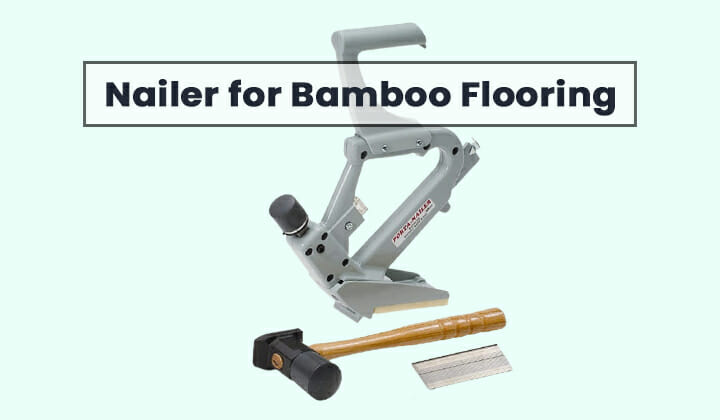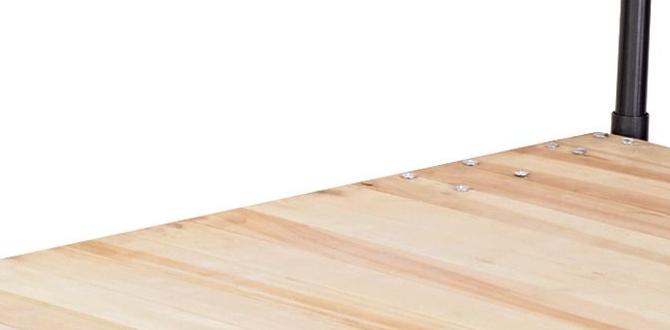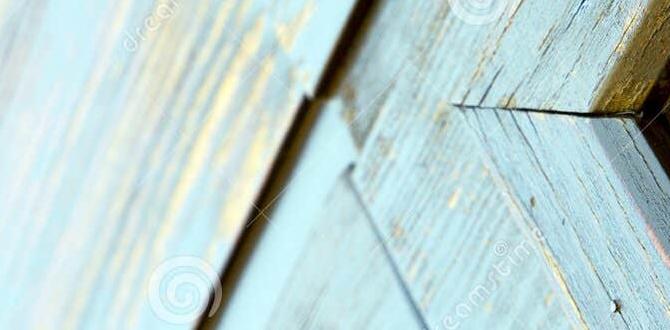An 18 gauge pneumatic flooring nailer is a suitable choice for bamboo flooring. It helps to reduce manual labor and makes flooring tasks easier and faster. In this article, we will look into some facts and have a detailed discussion. Don’t forget it’s a crucial decision before you start nailing.
Table of Contents
What Type of Nailer for Bamboo Flooring

Bamboo flooring is a task that requires tight preparation before installation. You need to be careful about the preparation before you start installing. An 18 gauge pneumatic flooring nailer could be a good choice for bamboo flooring projects—thousands of people worldwide nail down strand-woven bamboo floors.
Pneumatic Flooring Nailer
Pneumatic flooring nailers are the best choice when it comes to bamboo flooring. Any other guns will not hold well in this case, so flooring nailers are very important when bamboo flooring. It doesn’t require manual labor or extra muscle. It works through airpower; connecting it with an air compressor will do the work.
Pneumatic flooring nailers are specially made for flooring purposes which will help you to fasten your work in nailing down flooring and inserting nails at a 45-degree angle. Though it is not an automatic nailer gun, it needs a rubber mallet to hit with.

Nailing down is a common method used in bamboo flooring, but you have to make sure you have the right tool for that. If bamboo flooring is installed correctly, it can last a lifetime, even if it suffers heavy foot traffic. Nailing down is a standard method and inexpensive way of doing bamboo flooring, but after 5-10 years, the cleats or nails could become loose.

Glue or Nail For Bamboo Flooring?
Before installing, ask your bamboo floor wholesale supplier or manufacturer for recommendations. Glue or nails both have their conditions and uses considering bamboo flooring.
Nail
Nailing down is considered a standard method for wood subfloors. It perfectly suits installation over an existing hardwood surface. This method is relatively easy and quick compared to gluing. Hiring a professional for nailing down bamboo floors could be more expensive sometimes than gluing. When installing radiant heat bamboo floors, it’s better not to use nails.

Glue
You can glue a bamboo floor directly to concrete subfloors on or above grade. Gluing can be referred to as a safe and in-depth method. But when it comes to installing below grade, avoid using glue. Using glue directly to a concrete slab is done chiefly at above grade.
It is always safe to check the opinion of your bamboo flooring supplier. But most importantly, gluing gives you a safer and more secure process. Gluing is very secure. However, it’s tough to uninstall after installing glue.

Why Bamboo Flooring in the First Place?
It is a controversial topic if bamboo is a sustainable material or not. Plus, it is a fast-growing plant that you will find in vast quantities. It could be labeled as a renewable resource, and it can handle a good amount of pressure.
Pros of Bamboo Flooring
- Top-quality bamboo flooring could be as durable as traditional hardwood flooring. However, you need to look for a substantial warranty, as not all bamboo flooring isn’t made equal.
- For people who want modern decoration, bamboo flooring can provide them with a clean and contemporary look.
- If bamboo flooring is installed correctly, it is straightforward to clean it. You can clean it with just a mop and mild soap.
- Depending on the thickness, bamboo might be refinished like any other hardwood floor.
- Laminating the bamboo flooring, and gluing a top layer to multiple sublayers is a DIY-friendly method.
What Are the Barriers or Problems of Bamboo Flooring?
Bamboo flooring caught its attention after it was introduced a couple of decades ago. Usually, it is referred to as hardwood flooring. If we talk about the pros and cons of the bamboo floor, the topic of its sustainability arises. As it does have many pros, it also has its downsides.
Cons of Bamboo Flooring
- If you are looking to buy cheap and low-quality bamboo material, it might hurt your flooring process. And these cheap bamboo floorings are prone to scratches and dings, So, it does have a chance of destroying the look of your bamboo flooring.
- As you know, bamboo grass loves to absorb water and is prone to water damage. It can also suffer crucial damage in a high-humidity area.
- For a modern decoration look, bamboo flooring could be enough, but it doesn’t fit with all decorations.
- Last, of all, bamboo flooring has limited tonal shades.
Do You Need Underlayment for Bamboo Flooring?
If you don’t know what underlayment is, it is the process of laying down material on the floor before installing bamboo flooring. Whether you need underlayment for your bamboo flooring or not depends. If you are nailing down or floating a bamboo floor, you do need an underlayment. But if you are going down a bamboo floor, it is not required.
Underlayment can provide you with extra facilities such as soundproofing, moisture protection, and stability. It can also reduce squeaking problems—another thing you have to keep in mind is that the floor should be flat and solid before underlayment. If you find the floor flat and solid, even if the floor is made of concrete, wood, tiles, etc., you can use underlayment on it.
Does Bamboo Flooring Last Long?
Bamboo flooring materials are made differently than engineered hardwood floorings. Bamboo floorings materials are more rigid than any other ordinary hardwood materials.
You can find a bunch of practical benefits from bamboo flooring. If it is installed correctly and properly maintained, it can last upwards of 50 years of lifespan. However, the average lifespan of bamboo flooring is most likely 20-25 years, with normal family wear and tear.
Its durability is a thing to be mentioned as it is pretty hard compared to standard hardwood materials. Adding to it, it is termite resistant, and you can find it comes with various choices of stains and plank widths.
[aawp box=”B00BDPJ5GG” template=”vertical”]
Frequently Asked Questions (FAQ)
Why does sometimes a floating floor buckle?
The most common reason that your floating floor might buckle is that it has been damaged by water or the result of moisture. If you live in an area with consistently high humidity in the air, it might lead your floating floor to buckling problems or warping. Excessive water on the floor’s surface is also why your floor has buckling or warping problems.
Are floating floors noisy?
Yes, floating floors can be notoriously noisy. It isn’t attached to the subfloor so it can creak and crackle. Poor installation and poor-quality materials are the reason why your floating floors will make annoying noises. So, it’s imperative to install your floating floors that need to be done correctly and with high-quality materials.
Conclusion
After you’re done with the installation, the first thing you should do is vacuum the floor to get rid of any dirt/debris. Ensure to save some offcuts from the floor as you can test future cleaning products without damaging the laid floor. Strictly maintain the process so that it doesn’t leave any mistakes.

